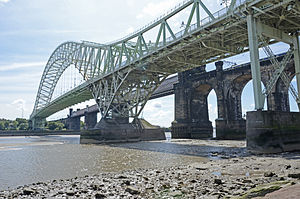Silver Jubilee Bridge
Coordinates: 53 ° 20 ′ 48 " N , 2 ° 44 ′ 16" W.
| Silver Jubilee Bridge | ||
|---|---|---|
|
The Silver Jubilee Bridge, behind it the Runcorn Railway Bridge |
||
| Convicted |
|
|
| Crossing of | River Mersey | |
| place | Runcorn - Widnes | |
| construction | Truss - arch bridge | |
| overall length | 482 m | |
| width | 16 m | |
| Longest span | 330 m | |
| start of building | 1956 | |
| completion | 1961 | |
| planner | Mott, Hay and Anderson | |
| location | ||
|
|
||
The Silver Jubilee Bridge , locally also simply called Runcorn Bridge , leads the A533 over the River Mersey and the Manchester Ship Canal, which runs next to it, in the English Unitary Authority Borough of Halton between the towns of Runcorn and Widnes . It stands at the narrow point of the river called Runcorn Gap about 30 m east of the Runcorn Railway Bridge , the last bridge before the mouth of the River Mersey in the Irish Sea .
history
The steel arch bridge, then called Runcorn-Widnes Bridge , was planned by Mott, Hay and Anderson and built between 1956 and 1961 by Dorman Long (superstructure) and Leonhard Fairclough (substructure and foundation). It replaced the transporter ferry Runcorn , which had carried road traffic across the river and canal since 1905.
The bridge was designed to handle 9,000 vehicles a day, but when it opened there were 11,500 vehicles. It had one lane in each direction with a single overtaking lane in the middle and a 1.8 m wide sidewalk on both sides
Between 1975 and 1977 it was overhauled and adapted to the traffic, which increased to 40,000 vehicles per day. Four narrow lanes were arranged on the road surface. For the pedestrians, a 1.75 m wide walkway was mounted on brackets on the eastern outer side. In celebration of Elizabeth II's Silver Jubilee , the name of the bridge was changed to Silver Jubilee Bridge .
In 2004 and 2009 further maintenance measures took place. In 2017 it was closed for repairs as the Mersey Gateway Bridge opened a few kilometers upstream to handle 80,000 vehicles per day. It is scheduled to reopen in 2020. Since it will then primarily serve local traffic, it should have two wider lanes and a cycle path and a sidewalk within the arched girders.
description
The river bridge is a 482 m long and 16 m wide, steel, riveted truss - arched bridge with a span of 330 m. The framework construction of the two-hinged arches extends beyond the two 76 m long side openings and together with them forms a continuous beam . The roadway girder is attached to the arches with 2 × 24 hangers at a distance of 12 m, which rest a few meters below it on joints that allow the bridge to extend lengthways.
The two ramp bridges, a total of 522 m long and curved in plan, are reinforced concrete T - beam bridges that rest on centrally arranged pillars with mighty trusses.
The bridge has been a Grade II * building under monument protection since 1988 .
Web links
Individual evidence
- ↑ a b Silver Jubilee Bridge (Runcorn Road Bridge) on engineering-timelines.com
- ^ A b R. Brueckner, P. Lambert: Renovation of the deck of a major listed bridge structure . In: CA Brebbia, L. Binda (Ed.): Structural Studies, Repairs and Maintenance of Heritage Architecture XII . WIT Press, Southampton 2011, ISBN 978-1-84564-526-7 , pp. 308 ( limited preview in Google Book search).
- ↑ Runcorn Widnes Road Bridge over River Mersey on HistoricEngland.org.uk


